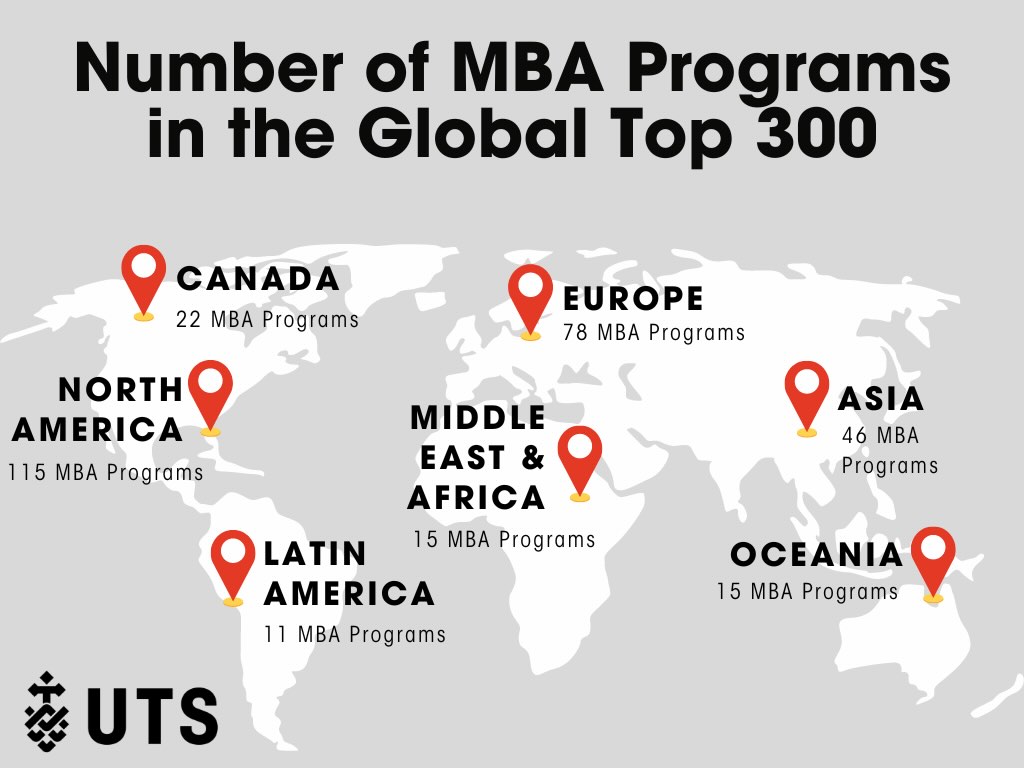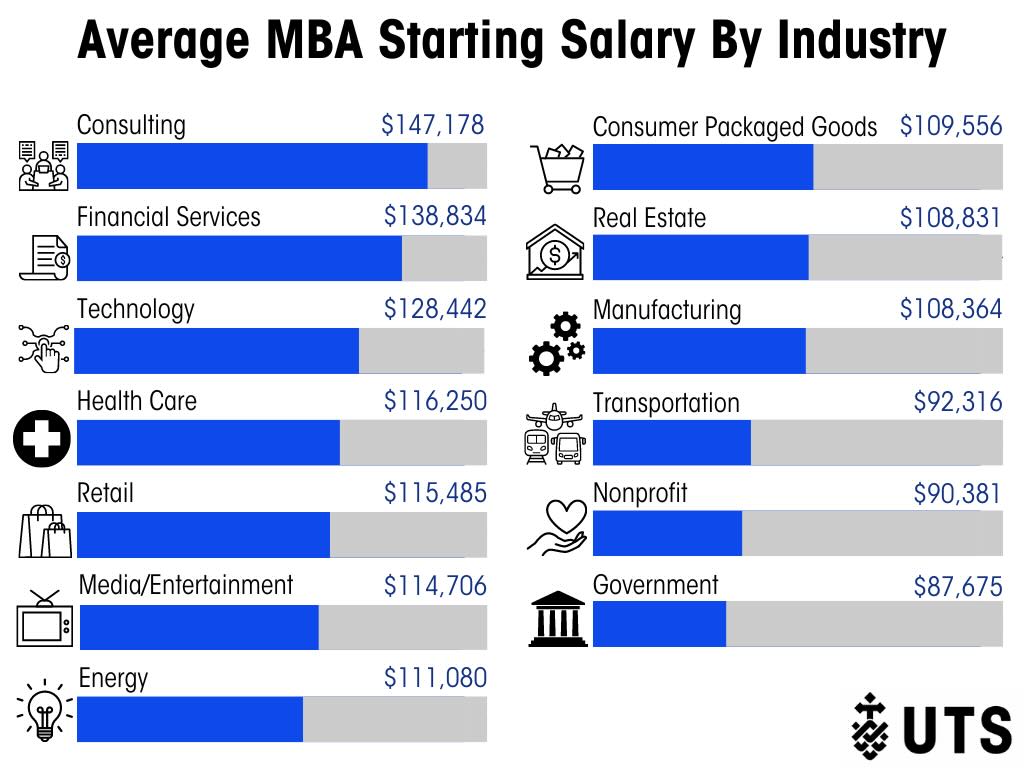Masters of Business Administration (MBA) Statistics Around the World 2023


A Master of Business Administration (MBA) is a popular degree offered by traditional and specialised business schools alike that provides students with theoretical and practical training for advanced business management. This degree can be applied to many professional fields of interest, including marketing, finance, general management, and more, making it adaptable yet timeless.
There are many reasons why pursuing an MBA course can benefit not only your future but also the future of your organisation. To fully understand these benefits, as well as what the MBA field looks like and how it may change in the future, we have provided a global analysis of MBA statistics and what they mean for you.
1. Global MBA trends
An MBA is a globally recognised degree, often considered essential to obtain top-level management positions in many fields. While MBA courses provide essential skills that can be applied to most management structures, they can also offer students the chance to specialise in a curriculum of focus paired with a certain industry. The adaptability of this degree is why many of the best business schools offer MBA courses and why most students that graduate with this degree can gain prestigious job positions within a matter of years.
Obtaining an MBA degree from a school that has been accredited by the Association to Advance Collegiate Schools of Business (AACSB) is a key indicator that the theoretical and practical skills you cover during your studies are industry-leading standards. Many MBA statistics are based on AACSB accreditation, including global MBA rankings and other areas of business standards.
- Since 2011-12, the MBA has been recognised as the number one choice for postgraduate education, surpassing a master's in education.
- Of the globally estimated 16,563 schools that offered business courses in 2021-22, only 5.7% held AACSB accreditation.
- As of 2022, the percentage of full-time faculty for MBA courses has grown by 9.2% since 2017.
Part-time faculty also showed significant growth during this time (14.3%), but they were hit harder by the pandemic, with 4.6% leaving the field.
Number of MBA courses worldwide

- From 2016-17 to 2021-22, there have been significant increases in enrolments for AACSB-accredited courses in schools, including:
- 1% increase for undergraduate courses
- 20% increase for graduate courses
- 16% increase for MBA courses
- 24% increase for master's specialist courses
- The fastest-growing regions for AACSM accreditation are Europe, the Middle East, and Africa, with 122 business schools as of June 2022 in total.
- The Graduate Management Admission Council (GMAC) noted a drop of 6.5% in applications to MBA courses during 2022. This is likely to be due to current industries focusing on retaining employees, rather than focusing on hiring new ones, deterring many potential MBA graduates. This is supported by the fact that many MBA-focused jobs have employees with 6+ years of experience making up their workforce. Executive MBA is made up of 72% of individuals who have more than 10 years of work experience.
MBA course diversity
- MBA graduates will find studying a specialisation during their course is beneficial if they have a certain industry they are looking to break into. Some of the most common industries that MBA students will find jobs in are:
- Finance
- Consulting
- Technology
- HR
- Healthcare
- Entrepreneurship
- When it comes to specialisation in master's courses for MBA, finance has become a major focus, with a 26% increase from 2016-17 to 2021-22. This means there have been over 7,000 additional learners in MBA courses specialising in finance.
- The fastest-growing master's fields by percentage growth are:
- Data analytics (263% increase)
- Quantitative methods (75% increase)
- Strategic management (54% increase)
- The prominence of technology in recent years has changed the way that the finance industry is structured, including creating new jobs that are massively applicable to MBA graduates. In fact, two of the five in-demand roles for finance are management-based. With an MBA degree, prospective students can look forward to new roles in management, such as:
- Finance entrepreneurs
- Virtual chief financial officers
- Wealth management consultants Generalist courses in the business masters area of study attract more applicants per seat on average than specialist courses (median of 4.2 vs median of 3.9), and are also more selective (52% acceptance rate vs 68%). However, 2022 showed a slightly greater growth in class size (43% vs 40%), indicating that graduates entering the business world are looking for specialised work.
- MBA courses face difficulty in gender parity when it comes to application rates, with the mean percentage of female applicants in 2022 being 46% for all business master's, and only 38% for an MBA course.
- 50% of business schools offer micro-credentials.
2. MBA admissions
The global rate of MBA admissions can tell a lot about the success and potential future of the degree and those interested in studying it. By assessing the trends in the various fields of MBA courses and the demographics involved, we can see how the course has changed and will continue to evolve.
- The average age of incoming MBA students is 28 years old.
- Online MBA courses reported a 50% growth in their total applications during 2019, likely due to the flexibility and convenience offered by remote learning.
- Globally, 40% of applicants to MBA courses in 2021 were female, with 39% of the global cohort being actually enrolled.
- The overall number of students enrolled in business schools increased by 43% in 2021, but the number of Executive Education specific students decreased by 46% during this time.
- The average work experience of those enrolled on MBA courses is 4 to 6 years.
- While only 13% of MBA courses were taught through hybrid teaching methods in 2020, this jumped to 19% in 2021 due to the effects of the pandemic. This percentage will likely rise as more online courses become available in the MBA field.
- Business master's courses are a popular option for business school students, with two in three candidates considering one of their course types:
- 21% choose a Master of Finance
- 19% choose a Master of Data Analytics
- 16% choose Master in Management or Global Management
- In the U.S., 2022 saw an increase in international applicants to business schools, with 54% of the nation's schools noting the growth.
- Globally, 35% of applicants to AMBA-accredited MBA courses in 2021 were international applicants, with 27% of students who enrolled identified as international students.
- The global acceptance rate to AMBA-accredited business schools in 2021 was 44%, with their global average yield coming to 71%.
- Median total applications to different MBA courses in 2022 are as follows:
- All MBA: 122
- Full-time MBA: 233
- Professional MBA: 101
- Executive MBA: 57
- The median acceptance rate in 2022 is as follows:
- All MBA: 68%
- Full-time MBA: 51%
- Professional MBA: 71%
- Executive MBA: 76%
- There has been a 5.4% year-over-year increase in applications to non-MBA business master's degree courses.
- The U.S. has noted a rise in women applying to Flexible MBA courses, with 44% of applicants identifying as women in 2022. This is the highest proportion of prospective female students in any MBA course.
- Despite European business schools showing a decline in applicants (5.1% year-on-year by 2022), even by international students, more women are applying to one-year full-time MBA courses. In total, 7 out of 10 MBA courses saw growth in female applicants, reaching a ratio of 37% to male applicants from the previous year's 35%.
3. MBA employment outcomes
The flexibility of an MBA degree means that a graduate could enter many professional fields and find prosperous career opportunities. These career paths can affect many aspects of a graduate’s life, including their potential salary, progression in their professional field of choice, and even what industries would be the most advantageous use of their degree.
Salaries

- The median percentage increase in total compensation for graduates already employed in the industry, which includes base salary, was 29% in 2022. Full-time MBA had the most success (60%), followed by professional MVA (38%) and business master's (29%).
- Male MBA graduates are expected to earn an average of 20% more than female graduates in any industry.
- The average salary for women with 0-2 years of experience in their respective MBA fields is $133,511. In contrast, men can expect an average of $144,956. After 9+ years of experience, women usually are paid an average salary of $179,159, whereas men are paid $241,607. This indicates that gender equality is not yet realised in the MBA field, despite the gender salary gap having narrowed by 19% between 2016 to 2020.
- There has been a noted rise in total compensation for graduates prior to graduate management education (GME) and after for most specialisations. For example, regionally, graduates of a full-time MBA course in 2022 saw rises in compensations of:
- Asia Pacific: $25,000
- Latin America, Middle East and Africa: $10,000
- North America: $40,000
- The average salary for an MBA graduate in the U.S. is $115,000.
- An MBA graduate's average starting salary, including bonuses, is over $105,000.
- The consulting industry is the highest-paying job market for MBA graduates, with a starting salary of $146,178. If you were working in consulting before earning your MBA, you can expect an increase in salary starting at $46,414.
In contrast, the Government industry has the lowest starting salary average of $87,675, and the Law industry has the lowest increase in salary from earning an MBA at just $8,138. - Entrepreneurs with an MBA typically earn more than corporate ladder climbers just three years after graduation.
Job placement rates
- More than half of corporate recruiters were planning or willing to hire international candidates in 2021. This number is expected to continue to rise over the years as international boundaries remain open following the pandemic.
- During 2022, 86% of business school graduates were employed by the time they graduated, up from 80% the previous year.
- 91% of graduates who studied in an Asia-Pacific school of business had a job by the time they graduated, up from 78% in 2021.
- 90% of European graduates were employed by graduation, compared to 75% in 2021.
- The most consistent method of successful job searching in 2021-22 was internships or work projects, which had a reported 60% success rate in 2022.
- Business master's had a 71% success rate
- Professional MBA students had a 68% success rate
- Asia-Pacific (66%) and Europe (56%) had much higher success rates than those who studied in North America (42%) or Latin America, Middle East and Africa (47%)
- 80% of MBA graduates are employed within three months.
- Over half of the globe's corporate recruiters have been projected to hire master of accounting graduates from 2021 onwards.
Industries and job functions
- 57% of those who wanted to make a career change within the MBA industry in 2022 said they were successful.
- 71% of MBA graduates were either ‘very satisfied’ or ‘fairly satisfied’ with the aid provided by their degree in obtaining career opportunities.
- If you have an MBA degree, you are more likely to succeed as an entrepreneur than someone who does not.
- 56% of graduates who made getting a promotion a goal in 2022 were successful.
- The most common industries MBA degree earners work in are finances, accounting, products and services, and technology.
- You are expected or required to hold an MBA degree if you are working in consumer marketing, corporate finance, and commercial banking.
- The most popular reason students gave for completing an MBA degree are:
- ‘To acquire more skills and knowledge about the business world’ (70%)
- 'To expand my area of expertise’ (67%)
- ‘To get a broader understanding of how business should be managed’ (50%)
4. MBA course costs
MBA course costs vary greatly between countries, business schools, and degrees of specialisation. Pricing and related factors are subject to changes due to a range of external and internal considerations, which should be observed to better understand MBA course cost trends in the future.
Tuition fees
- The annual cost of an MBA degree is $61,800 but can vary due to factors like financial aid, the business school, etc.
- Private business schools that offer MBAs usually cost ten times more than public school courses.
- During 2021-22, global business schools reported the maximum budget during this time was USD$229 million, over 600% more than the mean (just over USD$31 million).
- Most postgraduate students can expect to spend anywhere between $628-$1,471 on their courses’ textbooks, but MBA graduates can expect to pay a significant amount more at $1,000-$4,000.
- Online MBA courses cost an average of 25% less than on-campus courses.
- For most business schools, 80% of funding was overwhelmingly drawn from general tuition and student fees. With the average operating budget for AACSB-member business schools has steadily increased over the last five years, it is clear that the tuition fees for students have also increased during this time.
- In 2021-22, only 1% of U.S. business school funding came from government grants and contracts, while these sources made up 6% of the Asia Pacific's funding.
ROI on MBAs
- 10-year ROI of up to 325% is expected for MBA alums who graduate from top-ranked business schools.
- 91% of recruiters plan to hire MBA graduates once they have completed their studies. This percentage rises to 96% when considering just global Fortune 100 companies interested in MBA graduates for their near-term hiring plans.
- 79% of MBA graduates will work for established companies, with another 10% going on to work as self-employed entrepreneurs.
- Attending a business school to obtain an MBA degree will all but guarantee the opportunity to network and create valuable business connections before graduating.
5. MBA country rankings
Global MBA rankings are an excellent source of information to understand where a country stands in terms of business school education and where you can obtain the best possible education possible for your MBA degree.
According to the QS Global MBA Rankings for 2023:
- The U.S. holds the top 3 spots for best MBA rankings held by universities, which was similar to last year’s rankings.
- The top-ranking score is 93.6, with most of the top 10 universities holding a score in the 90s.
- Singapore has 3 courses in the top 30 MBA rankings.
- France, the United Kingdom and Spain hold at least one spot in the top 10.
- Some of the lowest-ranking schools can be found in Canada, Colombia, the U.S., and select areas of Europe and Africa.
- All but one of 15 Oceania's universities come from Australia, with the single outlier coming from New Zealand.
- Five Australian MBA courses are among the world’s top 100.
- 11 of Australia's MBA courses showed improvement or remained unchanged in their score from the last year.
- Six courses are also ranked in the top 25 for “Class & Faculty Diversity”, an indicator of the university's gender and national diversity.
6. The future of MBA courses
Change is inevitable, and the emergence of new technology and teaching methods, alongside the effects of the pandemic, are sure to continue changing the landscape of business and MBA courses. In the face of rapid change and uncertainty, the positive outlook of an MBA is to equip students with the skillset, aptitude and connections to be successful and adaptive in their respective field.
A few final statistics around the outcomes and future of MBA courses are as follows:
- In 2022, 85% of MBA graduates rated the overall value of their degrees as good to outstanding, a slight rise from 82% in 2021. This upwards trend indicates that an MBA degree is likely to be one of the most fruitful career paths for students to engage in monetarily and for the securement of their future. So long as global MBA courses continue to follow their existing standards and work to adapt their teachings to the ever-changing world.
- Industries like healthcare, non-profit, and clean energy have not shown significant growth in MBA applicants for several years now, and this is not projected to change in the future. This may be due to the fact that these industries have to compete against the high salaries offered by industries like tech and finance.
- Many students believe that postgraduate recruitment will be far more difficult to achieve in the future than undergraduate recruitment. This may be due to pandemic-caused disruptions to communication lines between business schools and industry representatives; namely through loss of internships, interactive courses, etc.
- 80% of business schools already offer online courses and degrees. This number will likely increase as more schools adopt hybrid or fully-online learning.
- Despite the apparent success guaranteed by graduating from an MBA course, only 77% of students in 2022 agreed that "a graduate business education is worth the investment even in times of economic uncertainty”. This is a drop from 80% in 2021 which, while seemingly insignificant statistically, could indicate the increasing unease of job security by the younger generation, even with a degree as adaptable as an MBA.
- Between 2018 and 2022, there has been a 37% rise in students using apps as a part of their business school studies. This is part of a greater trend in digital tool usage for studies and work alike.
- Over half of business school leaders believe that the role they play in society is to develop and nurture responsible managers for the global market.
- Over 90% of students in a 2021 survey believed that the effects of the pandemic and the progression of technology mean that the mass introduction of digital and remote teaching is incredibly likely in business schools.
- There has been a growing trend in MBA graduates heading into the automotive tech industry, which can be accredited to the increasing success and career options of companies like Uber or Tesla. This is a small section of the overall growing application to the transport and logistics industry.
- Personalisation of learning experiences continues to be a prominent aim for many business schools in the process of teaching, which is believed to allow students to make the most out of their university years.
- Ethical business practices have become a greater concern for recent graduates when compared to those who finished their MBA degree in the 1990s and beforehand. 21% of recent graduates said they earned their degree to create a sustainable business, compared to the 7% who graduated 21 or more years ago. Similarly, 13% gained their degree to learn ethical business practices, compared to the previous 6%.
- 56% of business school students and recent graduates in 2022 believed a mobile phone was essential to completing their management course. Phones will likely join laptops and tablets as regular tools for learning engagement in the future.
- Last year, 80% of business school leadership found that they are under pressure to change their fundamental value proposition and business model. This may mean that the design and values of business schools are subject to significant change in the future.





